Yesterday, CNN’s John Blake published a lengthy report on Christian nationalism, with the provocative title “An ‘imposter Christianity’ is threatening American democracy.” Provocative not just because Christian nationalists would take issue with the “imposter” claim, but so, too, would many critics of Christian nationalism.

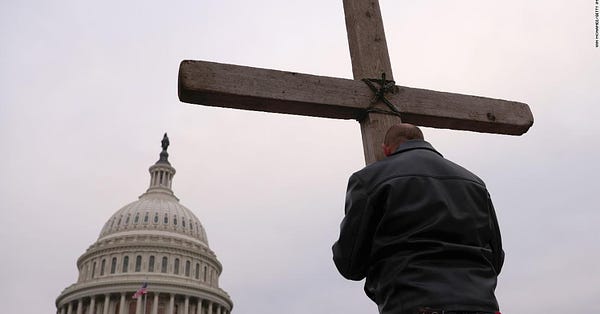
In the comments on the above tweet you can see people who are angry at CNN for smearing Christians. Meanwhile, elsewhere on Twitter, critics immediately pushed back against characterizing white Christian nationalism as anything other than actual Christianity.
A small sampling:

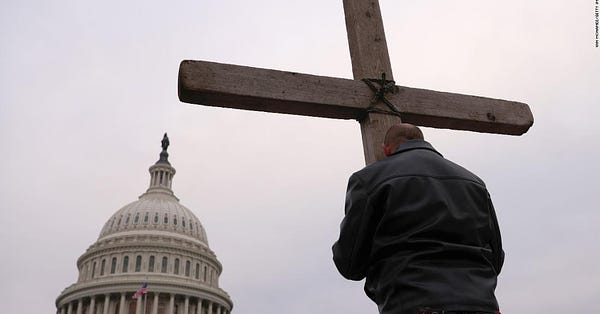
So, is white Christian nationalism real Christianity, or is it a distortion of true Christianity?
Both, depending who’s asking and who’s answering.
Here’s how I framed the piece:

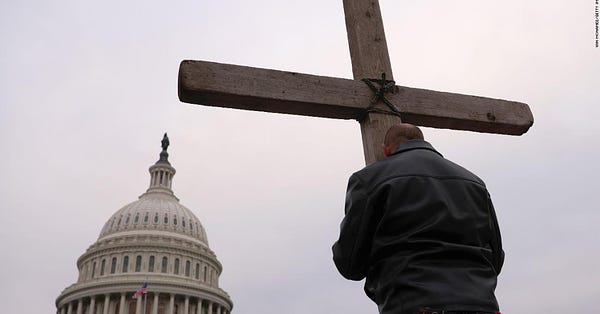
As a historian of American Christianity, there’s an easy answer:
Yes, this is American Christianity.
White Christian privilege was woven into the very fabric of our nation from its very inception. Slaveholder Religion is real, and it has a powerful hold on how many American Christians understand and live out their faith. Moreover, before America came into existence, Christianity had been wedded to imperial power for well over a millennium.
Which isn’t to say that this is the whole of American Christianity. To insist that it is, is to erase the many expressions of Christianity that have contested this particular form of Christianity. Consider, for example, the prophetic tradition that has characterized much of African American Christianity across the centuries. Nor is it the whole of global Christianity. As a historian, it isn’t difficult to acknowledge that both of these things are true.
I reminded readers of this tension in the introduction to Jesus and John Wayne:
“Across two millennia of Christian history—and within the history of evangelicalism itself—there is ample precedent for sexism, racism, xenophobia, violence, and imperial designs. But there are also expressions of the Christian faith—and of evangelical Christianity—that have disrupted the status quo and challenged systems of privilege and power. The Christian Scriptures contain stories of a violent warrior God, and of a savior who summons followers to care for the “least of these.” The Bible ends in a bloody battle, but it also entreats believers to act with love and peace, kindness, gentleness, and self-control.”
Why is it important to acknowledge that both are true? I go on:
“Contemporary white evangelicalism in America, then, is not the inevitable outworking of “biblical literalism,” nor is it the only possible interpretation of the historic Christian faith; the history of American Christianity itself is filled with voices of resistance and signs of paths not taken. It is, rather, a historical and a cultural movement, forged over time by individuals and organizations with varied motivations—the desire to discern God’s will, to bring order to uncertain times, and for many, to extend their own power.”
It is important to note, however, that this isn’t just a conversation among historians. It’s also a conversation among Christians, and that internal conversation is an important one. This is the “matter of theological debate” that I refer to in my tweet. For Christians, it is appropriate, even necessary, to make a case for which version of Christianity is closer to what we hold to be the defining truths of our faith tradition.
Yes, you can prooftext a Bible verse to make the case for a religion of conquest or liberation. But how do we interpret these passages? Is Jesus a conquering warrior who calls us to fight his battles? Is he a suffering servant who offers himself as a sacrifice and bids us do the same? What is the grand narrative? How do we understand the historical context? How does church history inform these questions? And, importantly, who gets to answer these questions? For people who believe the Bible speaks with any sort of authority, these are critical questions to examine. And these internal debates are hardly new.
Here’s my concluding paragraph in Jesus and John Wayne:
“Although the evangelical cult of masculinity stretches back decades, its emergence was never inevitable. Over the years it has been embraced, amplified, challenged, and resisted. Evangelical men themselves have promoted alternative models, elevating gentleness and self-control, a commitment to peace, and a divestment of power as expressions of authentic Christian manhood. Yet, understanding the catalyzing role militant Christian masculinity has played over the past half century is critical to understanding American evangelicalism today, and the nation’s fractured political landscape. Appreciating how this ideology developed over time is also essential for those who wish to dismantle it. What was once done might also be undone.”
Let’s reflect, though, on what’s at stake in this larger conversation.
First, it’s important to acknowledge that critics have good reason to push back against the assertion that white Christian nationalism isn’t “real Christianity.” This sets up a No True Scotsman fallacy in which only things that are good and lovely count as “Christian,” which ends up bolstering Christians’ sense of their own purity and innocence, priming Christians to accept false narratives of victimization, and in powerful but often subtle ways reinforcing Christian supremacy.
One of my favorite essays explicating how this works within American evangelicalism in particular is #ItsNotUs: Being Evangelical Means Never Having To Say You’re Sorry, by Tim Gloege. Gloege’s focus is on American evangelicals, but his critique is one that could be extended to Christianity more broadly.
That said, one can point out that white Christian nationalism isn’t the entirety of Christianity, or of American Christianity, or of white American Christianity, without participating in Christian supremacist propaganda, even if at times this claim can function in that way. Pointing these things out is also an accurate representation of history, and of contemporary Christianity.
Moreover, rather than shielding Christianity from blame, pointing out that not all Christians hold to these values can also play a strategic role in challenging the ideology of white Christian nationalism.
Christian nationalists generally assume that their version of white Christian nationalism is Christianity, and thus see any critique of white Christian nationalism as an attack on Christianity itself. This is a powerful way in which they mobilize other Christians, including those who may not themselves be “ambassadors” of Christian nationalism, to use terminology devised by Perry and his co-author Andrew Whitehead in their Taking America Back for God. For this audience in particular, the distinction can be critical, and it is a distinction that needs to be made publicly if one wishes to disrupt the power of white Christian nationalists to define the terms.
At a time when many Christians have been told that Christianity is under attack, it can be crucial for scholars, and for Christians, to disrupt this narrative. As I understand it, this was Sam Perry’s point in noting that many who hold to what would be considered “orthodox Christianity” in fact reject the central tenets of Christian nationalism. For those who wish to combat Christian nationalism, this can be a strategic move. (See, for instance, the name of an organization such as Christians Against Christian Nationalism.)
When I wrote Jesus and John Wayne, I hesitated to bring myself into the story, primarily because I wanted to be perfectly clear that I was writing first and foremost as a historian. I did end up bring myself into the narrative, sparingly, and only at the urging of my editor at the very last minute. And there were good reasons to do so.
But it was both as a Christian and as a historian that I knew that the version of Christianity I narrated wasn’t the only version of Christianity. And I knew that this was a legitimate point to recognize not because it offers a handy excuse for Christians behaving badly, but because it leads us to ask why are these Chrs, in this moment, choosing this version of the faith? It speaks directly to “Bible-believing Christians,” on their own terms, stripping away false pretences and forcing a reexamination of basic truth claims. By declining to accept Christian nationalist definitions of what is “biblical” and “traditional” at face value, it instead prompts the examination of those claims not simply as religious convictions but as assertions of power. And it demands that theological beliefs be situated in the context of other interests—things like racial privilege, class identity, and gendered relations of power. In all of these ways, it can invite more critique, not less.
I confess I did not expect to be asked about my own faith as frequently as I have been since the publication of Jesus and John Wayne, by other Christians, by members of the media, and by people of other faith traditions. There are many reasons I get this question: simple curiosity (“How can Christians possibly believe these things that run contrary to what I always thought were core Christian teachings?” or, conversely, “How can you as a Christian critique Christianity in this way?”); credibility (“Look, she’s not an outsider, she knows what she’s talking about, and she’s not an enemy of Christianity”); or critique (“Can we trust her to get the story right if she is a Christian?”)
That last question is a fair question, and it’s not one that I can answer myself. Ideally, however, any answer will involve a careful examination of my scholarship, weighing its strengths and weaknesses.
I do think a scholar’s positionality matters, although not always in simplistic or predictable ways, and for this reason it is critical to bring many voices into this conversation, including (perhaps especially) the voices of those who are not white and who are not Christian.
Getting this conversation right, with all of its nuance, is important. Getting it right shouldn’t distract from the larger purpose, but rather should be in service of the larger purpose: properly diagnosing a critical threat to American democracy.
Even a few months ago, many American Christians who would objectively qualify as Christian nationalists by any sociological measures, rejected the term. Some still do, but more recently we’re seeing more Christians openly embrace and defend Christian nationalism.
Christians can (and should) debate the legitimacy of Christian nationalism as a faithful expression of core biblical teachings. But it is also critical, in this moment, that Christians, scholars, and journalists alike pay careful attention not only to whether people want their values reflected in our nation’s laws and norms (whether those values are rooted in Christianity or otherwise), but more urgently, to whether those who do are committed to the democratic process and to upholding the Constitutional rights of all Americans, including those who do not share their values.




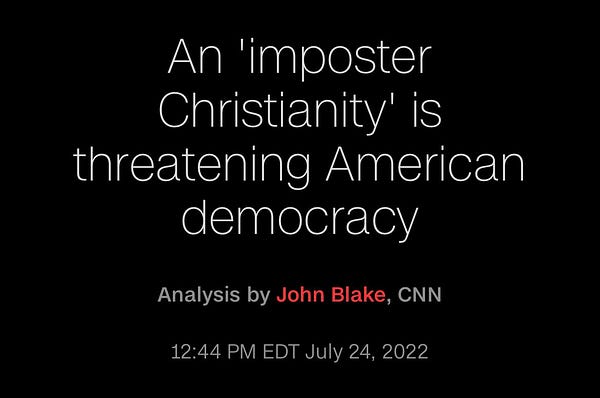
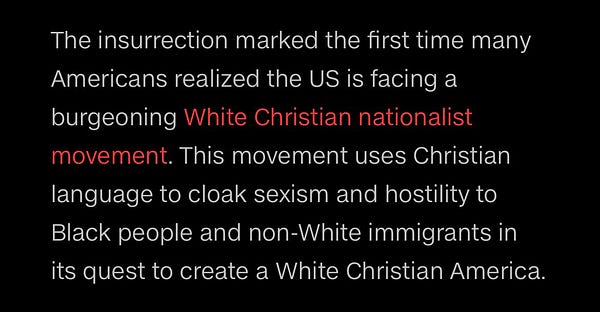
I was fascinated by "Jesus and John Wayne". I am a lifelong mainline Christian: Congregational/United Church of Christ, then Methodist and for the last 20 years Presbyterian Church (USA). I was unfamiliar with evangelicalism until my wife and I moved to Southern California in 1976. As I read your book, I felt like I was learning about an entirely different culture rather than doctrinal variations, e.g., Calvinism or Arminiasm, among mainline denominations.
Up until fairly recently my church, which is a few miles from the Reagan Library, had people with a mix of theological views ranging from fundamentalist to progressive as well as a broad mix of political views. Starting with Trump and accelerated during the pandemic, local churches have become more sorted along ideological lines. My church has lost cultural conservatives, but gained millennial and Gen Z people, as well as older exvangelicals including men and women with divinity degrees. The culture has moved steadily in the progressive direction. At the same time, other local churches, based on their public pronouncements. appear to have an increasingly militant culture like what you described in J&JW.
Some of us alternate between lamenting the increasing polarization and thinking we should identify as a different religion entirely.
While the scholarship is impeccable, the thing that makes your work so valuable is your willingness to explain how your own faith causes you to see the issues. Those of us trying to speak to both the Trumpy boomers in the pews and their ex-vangelical kids need all the help we can get!